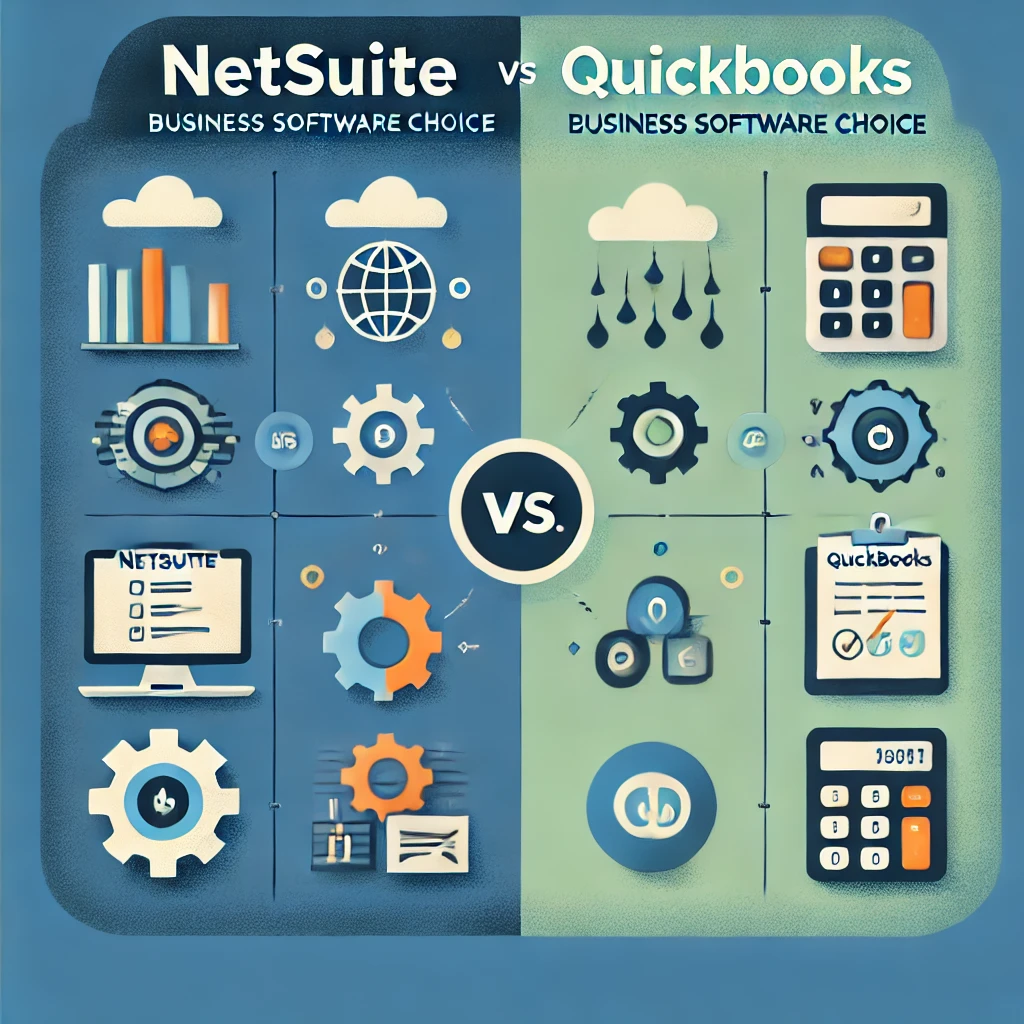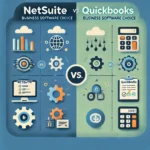When it comes to accounting and enterprise resource planning (ERP) solutions, NetSuite and QuickBooks are two of the most popular choices for businesses of all sizes. While both platforms provide valuable features for managing financials, they cater to different business needs. In this post, we’ll explore the key differences between NetSuite and QuickBooks to help you decide which one is the best fit for your company.
1. Overview of NetSuite and QuickBooks
QuickBooks, developed by Intuit, is a popular accounting software primarily aimed at small businesses. It offers a range of tools to help manage invoicing, payroll, expense tracking, and tax preparation. QuickBooks is widely recognized for its ease of use and affordability, making it a go-to solution for startups and small business owners.
NetSuite, on the other hand, is a comprehensive cloud-based ERP solution owned by Oracle. It goes beyond accounting, providing robust tools for inventory management, CRM, project management, and e-commerce. NetSuite is designed for growing businesses and enterprises that need more advanced capabilities and scalability.
2. Key Features Comparison
| Feature | QuickBooks | NetSuite |
|---|---|---|
| Accounting and Invoicing | Core feature, easy to use | Comprehensive, multi-entity support |
| Inventory Management | Basic inventory tracking | Advanced inventory and order management |
| Reporting and Analytics | Standard financial reports | Advanced analytics with customizable dashboards |
| Project Management | Limited | Full project management suite |
| Multi-Currency Support | Available in higher plans | Native multi-currency support across modules |
| User Permissions | Basic user roles and permissions | Granular control over user roles and permissions |
| Mobile App | Yes, user-friendly | Yes, robust capabilities |
3. Pricing
QuickBooks is known for its affordable pricing plans, making it a suitable option for startups and small businesses. The cost typically ranges from $30 to $200 per month, depending on the features you need.
NetSuite, being a comprehensive ERP system, comes with a higher price tag. The pricing can vary widely based on the number of users, modules selected, and the complexity of the implementation. For mid-sized businesses and enterprises, the cost often starts in the $1,000s per month.
4. Scalability
While QuickBooks is excellent for small businesses, it can become limiting as your company grows. Larger businesses with complex requirements may find it challenging to manage multi-entity operations, inventory, and advanced reporting with QuickBooks.
NetSuite, on the other hand, is built for scalability. It supports large organizations with complex structures, offering advanced features like multi-entity management, global accounting, and real-time analytics. As your business expands, NetSuite can easily accommodate additional modules and users.
5. Integration Capabilities
QuickBooks integrates with many third-party apps for time tracking, CRM, payroll, and more. However, integrating it with more sophisticated systems or creating custom workflows can be challenging.
NetSuite excels in integration, with a built-in SuiteCloud platform that allows for extensive customization and seamless integration with other business systems, including e-commerce platforms, CRM solutions, and third-party applications.
6. Customization Options
With QuickBooks, customization options are limited compared to NetSuite. While it provides some flexibility with templates and basic settings, businesses requiring more extensive customizations may struggle.
NetSuite, in contrast, offers highly customizable workflows, dashboards, and reports. Its flexible platform allows businesses to tailor the system to meet unique requirements, making it ideal for companies with specific industry needs or complex processes.
7. Customer Support
Both platforms offer customer support, but there are some differences in the level of service provided:
- QuickBooks offers online resources, chat support, and phone support. The quality of support can vary, especially for users on lower-tier plans.
- NetSuite provides a range of support options, including dedicated account managers for larger customers, comprehensive documentation, and 24/7 technical support for mission-critical issues.
8. Which One Should You Choose?
The choice between NetSuite and QuickBooks depends on your business’s size, complexity, and growth trajectory.
- Choose QuickBooks if:
- You are a small business with straightforward accounting needs.
- You prefer an affordable, user-friendly solution.
- You don’t require complex inventory or project management features.
- Choose NetSuite if:
- Your business is growing rapidly, and you need a scalable solution.
- You require advanced features for inventory, CRM, or project management.
- You want a comprehensive ERP solution that can integrate with other business systems.
Conclusion
Both NetSuite and QuickBooks are powerful tools in their own right, but they cater to different markets. QuickBooks is perfect for small businesses looking for simplicity and affordability, while NetSuite provides an all-encompassing solution for growing companies in need of a robust ERP system. Evaluating your current and future business needs will help you choose the right platform to drive success.




